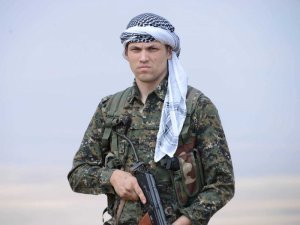A 28-year-old Wisconsin man named Jordan Matson is reportedly in Syria and fighting with a Kurdish militia as they battle the jihadist group Islamic State (also known as ISIS or ISIL). Back in the US, people identifying themselves as Matson’s friends have created a page on Facebook on which they are sharing pictures of Matson and cheering him on with memes.
A spokesperson for the Kurdish Yekineyen Parastina Gel, or YPG, told Reuters Matson was one of three American fighting with the group. They said he was in northeastern Syria.
UPDATE:
Good news if true via the AP:
The U.S. military said Sunday it had airdropped weapons, ammunition and medical supplies to Kurdish forces defending the Syrian city of Kobani against Islamic State militants.
The airdrops Sunday were the first of their kind and followed weeks of U.S. and coalition airstrikes in and near Kobani, near the Turkish border. The U.S. said earlier Sunday that it had launched 11 airstrikes overnight in the Kobani area.
In a statement Sunday night, U.S. Central Command said U.S. C-130 cargo planes made multiple drops of arms and supplies provided by Kurdish authorities in Iraq. It said they were intended to enable continued resistance to Islamic State efforts to take full control of Kobani.
The airdrops are almost certain to anger the Turkish government, which has said it would oppose any U.S. arms transfers to the Kurdish rebels in Syria. Turkey views the main Kurdish group in Syria as an extension of the Turkish Kurd group known as the PKK, which has waged a 30-year insurgency in Turkey and is designated a terror group by the U.S. and by NATO.
President Barack Obama called Turkish President Recep Tayyip Erdogan on Saturday to discuss the situation in Syria and notify him of the plan to make airdrops Sunday, one administration official told reporters. He would not describe Erdogan’s reaction but said U.S. officials are clear about Turkey’s opposition to any moves that help Kurdish forces that Turkey views as an enemy.
It’s about freaking time.
The Kurds should be thanking God that their moment of need came within weeks of the United States’ midterm elections. With the American people now paying attention to what’s going on in the Middle East, Obama couldn’t risk allowing Democrats to receive the brunt of the voters’ wrath in the wake of another major massacre.



